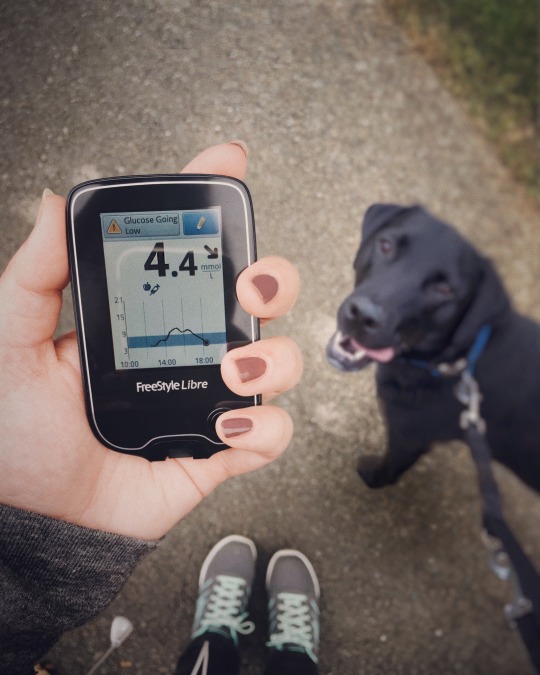#Glucose Monitors
Text
Coming today to The Sims 4!!

8 notes
·
View notes
Text
Oh my god i almost ripped out my glucose monitor taking off a t-shirt. I might not be smart enough to live some days
1 note
·
View note
Text
Libre 3 Recall

[Image Description: headline "Continuous Glucose Monitoring (CGM) Sensor Recall: Abbot Diabetes Care Inc Issues Recall For Certain FreeStyle Libre 3 Sensors due to Risk For Inaccurate High Glucose Reading" The paragraph beneath it says "This recall involves removing certain devices from where they are used or sold, and does not apply to the Libre 3 reader or app. The FDA has identified this recall as the most serious type. This device may cause injury or death if you continue to use it." End I.D]
ID by @arctic-hands
#this explains why my mom's been woke up multiple times with readings that were too high#but when she prick tested herself her glucose was perfect#good news is the alarm works and makes everyone up#bad news is the alarm works and makes everyone up for no reason#I swear in the past couple months it's been at least two to three times#middle of the night alarm goes off glucose is super high according to the libre#then she tests it and then it's fine which is great but also really annoying#libre#libre 3#diabetes#glucose monitoring#fda recall#recall
198 notes
·
View notes
Text
Diabetic Zoro, is that anything?
#roronoa zoro#I saw an image and mistook something for a glucose monitor. started thinking. don't know if I know enough to do anything with this.#so I'm just holding it.#one piece#phoenix talks#diabetes headcanons#disability headcanons
196 notes
·
View notes
Text

We are Urgently issuing a Voluntary recall of the sensor embedded in your body?
44 notes
·
View notes
Text

#this is the most annoying thing ever actually like. why ru lying to me >:(#type one diabetes#actually diabetic#diabetic#diabetes#t1d#type one diabetic#dexcom#cgm#constant glucose monitor
88 notes
·
View notes
Text



I really wanted to do the cute valentines prompts but had no time ´;w;` )o still I had to do somethin sweet with my most beloved darlings before the month is over ! 💕
A intense kiss inspired by the first half of Oomph!'s Ich will deine Seele (second half doesn't count, no sad endings on my watch!!)
& an elderly version as they get to grow old together, always and forever completely in love 🥰💘
#my art#metalocalypse#toki wartooth#skwisgaar skwigelf#skwistok#goofy ahh closeup on the top one cuz I dont want the post to be 800 miles long if I show both pics in full OTL#yes I am very attached to my old man designs.. I love elders I love aging I love watching the feeling last for decades n only grow stronger#also givin tokis a glucose monitor cuz I think it would be a lot easier for him than havin to remember to check himself <3#having a [hearin ur own heartbeat from its intensity] lovey doki moment hyehehe#dethentine's#technically.. 800years late out of order n just two asfasffohf im sowwy maybe ill do the rest when I have time
377 notes
·
View notes
Text

Ring of blood stability is a glucose checker/companion for your ttrpg
works with both dnd and pathfinder!
can get for PWYW on my ko-fi now https://ko-fi.com/s/57da2a2e5b
remember diabetics can also be adventurers
big thanks to technomancer kyle for advice: check out his kofi here https://ko-fi.com/s/57da2a2e5b
#digital art#artists on tumblr#disability inclusion#disability aids#disabled#disabled representation#ttrpgs#magical items#diabetes#glucose monitor#pathfinder#dnd#dungeons and dragons
135 notes
·
View notes
Text
Tired: I have a giant horrible bruise because my diabetes tech/CGM tried to murder me again.
Wired: I've been gored by the Continuous Glucose Minotaur
#my life#diabetes#cgm#continuous glucose monitoring#continuous glucose monitor#not trek#continuous glucose minotaur#i do not bruise easily but damn it's carnage#sorry this is off-brand but this is the only social media site that i thought would appreciate this joke
53 notes
·
View notes
Text

something something something today is World Diabetes Day, and what an absolutely incredibly shitty day it’s been!! :’) therapy was hard, work is its usual absurdity and to top it all off, my pharmacy’s run out of insulin (they joked that I should “try the black market instead” wtf??!!?)
anyway, here’s Dexter my (beloved) best friends dog. I like to think he knew my blood sugars were dropping because he kept nudging me on our walk until I checked 🩵
#probably wishful thinking as it’s not as if he’s had any training#but he is a wonderfully thoughtful soul so who knows#pupper#type one diabetes#t1d problems#t1d#t1dlookslikeme#world diabetes day#type one diabetic#dogs#puppers#freestyle libre#glucose monitor#glucose meter#Mellaithwen takes a photo#Dex the dog
43 notes
·
View notes
Text
Abbott is warning that sensors on some of its blood sugar monitoring systems may need to be replaced to prevent inaccurate readings.
Testing showed that some sensors on the FreeStyle Libre 3 system may incorrectly report high blood sugar levels, the medical device maker said Thursday. An inaccurate high blood sugar reading can prompt patients to take insulin when they don’t need it.
The devices were distributed in the first half of May in the United States. Abbott estimates that less then 1% of U.S. users are affected.
6 notes
·
View notes
Text
Beautiful women named "SENSOR ERROR" "SIGNAL LOSS" and "FAILED SENSOR" are blowing up my phone rn, it's okay, you guys can be jealous ;)
14 notes
·
View notes
Text
Why have people historically turned to predictive behaviours and beliefs, through premonitions; and how has this evolved in the modern world?
Abstract:
In my essay I aim to understand why people continue to turn to predictive behaviours, either supernaturally or through modern technology, despite all of the evidence which opposes their accuracy. I look at the validity of premonition claims and see how this has evolved with our modern desire to predict and control.
Introduction:
How do premonitions traditionally present?
A premonition is a forewarning, or presentiment. (Allen, 1990) Premonitions traditionally present as supernatural visions of the future and have often been believed in terms of contact with a deity. In ancient Greek times for example, an oracle would be consulted for prophecies of the future, often seeking guidance in times of uncertainty. In this essay I attempt to analyse why people are drawn to premonitions of the future, and how this has developed over time.
What are they, can they be explained?
I started by looking at Déjà vu and premonitions because of the link between the feeling of having already lived through a situation and the precognition of living through a situation. Also, Déjà vu is a common phenomenon, therefore it is easier to find more sound scientific data, rather than focusing on an isolated event where there is little way of discerning the truth. You can find more solid evidence for something observable, repeatable, and measurable, so there needs to be a way to reliably repeat the sensation of Déjà vu.
Methodology:
For this project I used studies to back up my main theories about premonition. For example, scientific research about Deja vu and the connection to people having illusory premonition, helped me to reach a conclusion about people relying on the illusion of control to feel secure. For example, the use of unreliable law enforcement technology, creating the illusion of security. I cross-referenced this with studies about how people's desire for premonition, or interest in supernatural abilities increases during times of low control, showing that it is not facts which people are looking for, but instead the comfort that perceived knowledge would give.
Literature Review:
I decided to use studies from academic journals to support my project, because they are a reliable source of information. This is because they have been peer reviewed in order to be published. However, there could be problems with funding, as this could create bias. I also used books, as they have had to go through the publishing process, and therefore have to be fact-checked. I used historical case studies from the ancient Greeks in order to show an example of a time where people have believed and relied upon premonition. This research was not intended to act as a reliable source, but instead show an example of illusory premonition, therefore the fact it is inaccurate is part of the research.
Main Findings:
Dr Anne Cleary’s Déjà vu Generator:
Dr Anne Cleary and her team created a virtual reality Déjà vu generator to try and find the link between precognition and Déjà vu. They spatially mapped scenes to have identical proportions, but the themes were unrelated. People were more likely to report Déjà vu in the scenes that spatially resembled earlier but forgotten scenes amongst spatially unique scenes. If a scene was similar spatially, then Déjà vu was 27% more likely, if it was similar in multiple ways, Déjà vu was 59% more likely. “We cannot consciously remember the prior scene, but our brains recognise the similarity. That information comes through the unsettling feeling that we’ve been there before, but we can’t pin down where or why.”Cleary (Cleary, 2018)
The Déjà vu generator then adapted to try and find an explanation for precognition. The same scenes were taken from the previous Déjà vu test, and converted into virtual reality tours, so that they would unfold over time like a real-life experience. So, a person would be following a virtual tour which would follow a particular navigational path through the scene, and end in a left-hand turn. Then later on in the study a person would be viewing an identically configured tour, following the same navigational path, but only up to a point, stopping just before the final left-hand turn. This was the method of putting someone in the middle of a memory to see if it would enable actual prediction, without being able to recall the previous tour. People showed no precognition ability whatsoever. However, they ran the study again and this time asked, “Do you feel like you know the direction of the next turn?”. Participants were 75% more likely to experience a feeling of precognition, and more likely to feel like they knew the direction of the next turn when they were experiencing Déjà vu then when they were not. (Cleary, 2018)
This experiment does explain Déjà vu, but does it really apply to real life premonitions? Because it does show that our past experiences will create a sense of familiarity and give someone feeling that they know what will happen next, but it doesn’t explain prewarning’s people have, namely ones which come true.
Cleary has a theory which could be used to counteract this, which is, when we are in the middle of a Déjà vu state, it feels like we are right on the verge of retrieving from our memory the entire situation around us, including how it unfolds. As the situation does unfold, and continues to feel intensely familiar, it could be taken to be a signal of having correctly predicted what was going to happen when we actually didn’t. In terms of the Déjà vu generator, when the tour went left, participants were asked if it unfolded as they had expected, and it was found that people are more likely to feel that they knew what would happen all along following Déjà vu. Another variant was run where participants were asked to rate how intense there feeling of familiarity within the scene was, and what was found was that when someone is faced with the juxtaposition of familiarity and novelty, when the familiarity is intense it can lead to an illusion of having known what would happen all along. (Cleary, 2018) (Cleary, 2018)
Analysis:
Cleary’s Déjà vu generator still does not explain prewarning’s of an event. There are cases where people experience and record a premonition before it actually happens, which undermines Cleary’s explanation of illusory precognition in these instances. However, the idea of prewarning’s being due to past experiences could still be valid. This is because being subconsciously reminded, by a feeling of familiarity of an event, could be experienced as a prewarning of the event reoccurring. But in these cases, to what extent would this be common sense rather than a premonition? It makes sense for us to learn from our past experiences and to use then to avoid bad events reoccurring, does that have to be a premonition?
As well as this, premonitions regarding the Titanic could be seen through this view too, as although it had never happened before, it makes sense that some people had concerns about its safety, and this does not have to be seen in a supernatural way. (Keefe, 2021) This is relevant to premonitions because it explains how we can understand them as an illusion.
Case study:
In 67 AD, Emperor Nero, who was just 30 years old and had killed his own mother in 59 AD, when visiting the Oracle was told: Your presence here outrages the god you seek. Go back, matricide! The number 73 marks the hour of your downfall! The incensed emperor had the Pythia burned alive. Nero thought he would have a long reign and die at 73. Instead, his reign came to a short end after a revolt by Galba who was 73 years of age at the time. (Parke, 2023)
Can these explanations make sense of the case studies?
Yes, they can, because the premonition was already desired. The fact that the premonition was considered relevant despite the leap to connect the information, surely shows the desire for the premonitions to be true that discrepancies are overlooked, the fact the man who killed him was 73 and not Nero himself.
What has driven the need for premonitions and does this explain their prevalence?
-socio-historical context:
Throughout history, premonitions of the future have been believed in a supernatural sense., such as visions from God, or going to an oracle. In these times people had little control over their lives, so feelingthey had access greater power acted as a comfort. In the case of Emperor Nero and the oracle, despite the vague nature of the premonitions, people would maintain faith in them, and even adjust their interpretation of the premonition to find a meaning in it. (Parke, 2023)Oracles would be consulted in times of uncertainty, when the future was unsure, and oracles would give a sense of comfort during that time. This is consistent with Dr Cleary’s conclusion that premonition relies on illusion and people’s faith in them does not come from any real insight into the future, but on a desire to believe that they have more knowledge than they really do.
-individual context:
Precognitive abilities would allow people to predict the future, thus belief in these abilities should be differently endorsed when people most desire prediction, that is in situations of low control. Therefore, belief in precognition is a predictive control strategy that people can turn to when feeling low in control. As a result, loss of control will cause an increase in belief in precognition. Loss of control has been found to increase other types of paranormal beliefs, like superstition, which also include an element of being able to predict, or at least guide the future. In the case of precognition, people have a direct and exact channel to knowing the future through psychic means. These types of beliefs should therefore be particularly attractive as predictive control strategies in so far as the give people the illusion of being able to predict and therefore control the future. (Greenaway KH, 2013)
Analysis:
This study is in agreement with the conclusions which Cleary drew from her study. She also concluded that it is illusory precognition which occurs, rather than true premonition.
Are they the actualisation of a need within individuals/society?
Research:
People were drawn to predictability when they experienced loss of control, even to the extent of endorsing seemingly irrational beliefs about precognition. Therefore, these kinds of beliefs are a response to control deprivation, as belief in precognition increases perceived control. Predictive arts are highest in times of threat and uncertainty. It is at these moments that individuals feel the need to control the course of their lives. Belief in precognition meets this need by enabling people to feel that the future is predictable and can therefore be controlled. Regardless of whether precognitive abilities actually exist, therefore, belief in their existence serves an important psychological function of boosting perceived control in times of uncertainty.
How do premonitions present now, what might this say about us?
Predictive Technology:
If belief in supernatural predictive abilities increases during times of uncertainty, then it makes sense that predictive technology should also experience a surge of popularity. However, the interest in this technology is, like supernatural premonition, not reliant on the accuracy of the technology, but on the perceived sense of control and power gained by the illusion of foreknowledge. This is highlighted by the use of unreliable technologies by the United States Law Enforcement Officers. This technology analyses data to try and predict who may commit crimes and where or when they are likely to be committed. (Fraerman, 2024) The persistent use of unreliable technology shows that people are drawn to the perceived comfort that this technology brings, rather than for any practical reasons.
Research:
Health monitoring as a whole has become increasingly popular, with the use of Fitbit’s and apple watches to monitor steps, sleep and even stress. (Burnham, et al., 2018) But recently there has been a trend of non-diabetics wearing continuous glucose monitoring devices. This could be used to demonstrate how people are drawn to predictive control behaviours as there are no real health benefits to wearing these devises and in fact, they can even cause harm by people becoming obsessive and even leading to eating disorders. But despite this Dr Surampudi says, “Wearing a CGM may help someone who is not diabetic make informed nutritional choices, but it also has the potential to cause users to become overwhelmed by the information”. (Surampudi, 2023)
Conclusions:
In conclusion, the interest in premonition, through supernatural means or predictive technology, is driven by the comfort that perceived knowledge brings, and it is irrelevant how accurate it really is. When people turn to premonition, they are looking for illusory control in a time where they are in fact lacking in control.
Bibliography:
Allen, R., 1990. The concise Oxford Dictionary of Current English. 8th Edition ed. New York: Oxford university press.
Burnham, J. P. et al., 2018. Using wearable technology to predict health outcomes: a literature review.
Journal of the American Medical Informatics Association, 25(9), p. 1221–1227.
Cleary, A., 2018. Youtube. [Online] Available at: https://www.youtube.com/watch?v=0M6qXYJkhDc [Accessed 9 July 2023].
Cleary, A. M. &. C. A. B., 2018. Déjà Vu: An Illusion of Prediction. Sage Journals , 29(4), pp. 635-644..
Fraerman, A., 2024. RELYING ON UNRELIABLE TECH: UNCHECKED POLICE USE OF ALGORITHMIC TECHNOLOGIES. Santa Clara High Technology Law Journal, 40(2).
Greenaway KH, L. W. H. M., 2013. Loss of Control Increases Belief in Precognition and Belief in Precognition Increases Control. PLoS ONE. Keefe, T., 2021. Premonition of the Titanic disaster. 1st ed. Leicestershire: Matador.
Parke, H. W., 2023. Wikipedia. [Online] Available at: https://en.wikipedia.org/wiki/List_of_oracular_statements_from_Delphi [Accessed 15 April 2024].
Surampudi, V. M. M., 2023. UCLA Health. [Online] Available at: https://www.uclahealth.org/news/continuous-glucose-monitoring-becoming-popular-among-non [Accessed 10 December 2023].
#old project#premonition#future#predictions#precognition#precognitive dreams#algorithms#continuous glucose monitoring#illusion#mind#predictive technology#fitness monitoring#oracles#oracle of delphi#knowledge#control
3 notes
·
View notes
Text
Me, at 2 am: *eating crackers and half a SunnyD in my room, wondering why god has forsaken me*
#damn low blood sugar is fun#my glucose monitor has already woken me up three or four times tonight#it's fucking 2 am and I just wanna sleep#I feel like shit#SunnyD save me
3 notes
·
View notes
Text
Gonna give CGMs another try on my next days off. Hopefully it works out better (it will). I also ordered stickers for them cause I'm always down for something functional & fun. I'm most excited for this one.

3 notes
·
View notes
Text
i want them to add working mobility aids to the sims 4 :(
#they made a big deal out of medical wearables a while back and added glucose monitors and hearing aids yay and then they stopped#p
6 notes
·
View notes